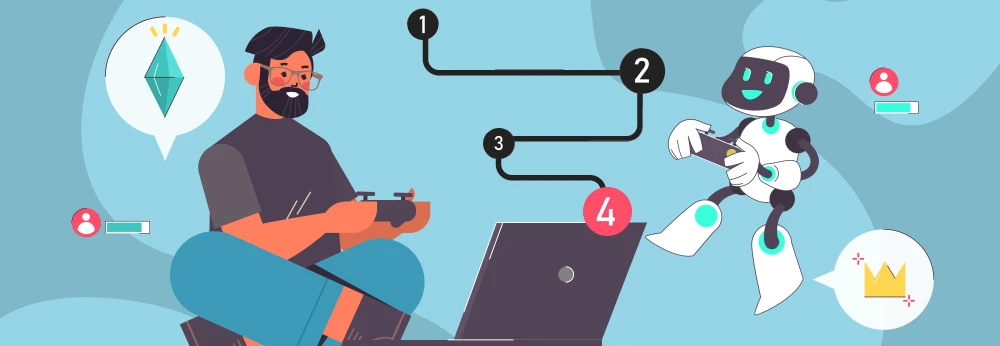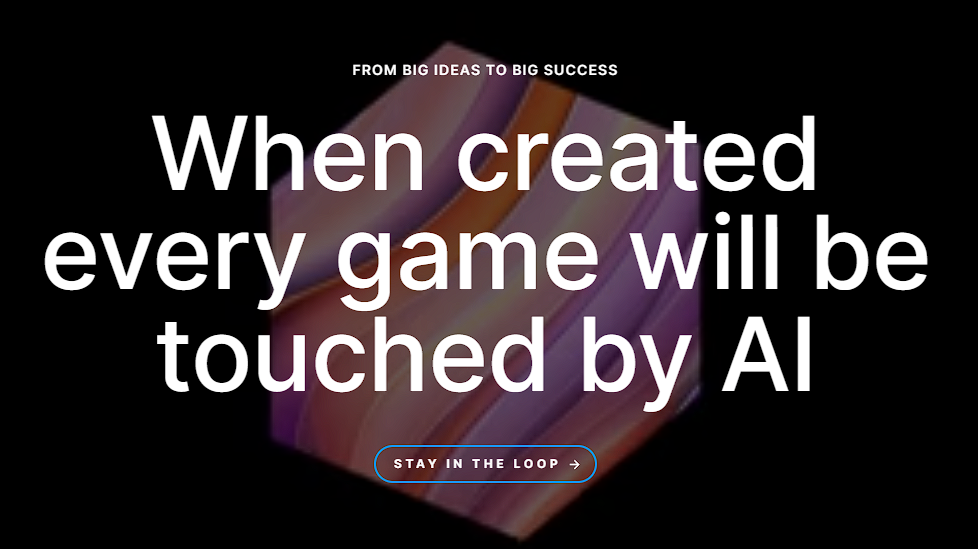.jpg?2026-02-17T14:47:30.411Z)
When Leroy Merlin ran out of hands, InAppStory became the extra ones

Unveiling the Future: The Convergence of Mobile Gamification and AI
Mark Polskii
Author @ InAppStory
In the digital era, the lines between technology, entertainment, and personalization blur more each day, giving rise to innovative intersections that captivate users worldwide. Among these intersections, the convergence of mobile gamification and artificial intelligence (AI) stands out as a particularly dynamic and transformative pair. Gamification, the application of game-design elements in non-game contexts, seeks to enhance user engagement and motivation, while AI, with its ability to learn and adapt, brings a layer of personalization and efficiency previously unimaginable. This unique convergence is not just reshaping how we interact with mobile applications; it's redefining the boundaries of user experience, engagement strategies, and the technological possibilities within our grasp. Through this article, we'll explore how the marriage of mobile gamification and AI creates unparalleled opportunities and introduces new challenges, driving forward the evolution of mobile technology in ways that are both profoundly impactful and intriguing.
The Fundamentals of Mobile Gamification and AI

The realms of mobile gamification and artificial intelligence (AI) each represent cutting-edge approaches to engaging and retaining app users. Before we delve into their unique convergence, it's crucial to understand the fundamentals of each concept and how they have independently shaped user experiences in the mobile ecosystem.
Mobile Gamification Explained: Gamification involves applying game-design elements and principles in non-game contexts to enhance user engagement, motivation, and loyalty. In mobile applications, this could manifest as point scoring, competition with others, rules of play, and other game-like elements designed to increase user interaction and time spent within the app. Popular examples include fitness apps that use challenges and rewards to motivate physical activity or educational apps where learners earn badges as they master new skills.
The Role of AI in Mobile Applications: Artificial intelligence in mobile apps goes beyond mere functionality; it introduces a level of adaptiveness and personalization previously unseen. AI can analyze user data in real time, making personalized recommendations, optimizing user experiences based on behavior, and even predicting future needs. Whether through chatbots that improve customer service or recommendation engines that curate personalized content, AI's role is to make the app experience more engaging, efficient, and tailored to the individual user.
Importance of Their Convergence: The intersection of mobile gamification and AI represents a significant evolution in user engagement strategies. Gamification taps into the intrinsic human love for games and competition, while AI ensures these elements are deeply personalized and adaptive. This convergence is particularly important in a world where user attention is fragmented and retention is paramount. By leveraging AI to tailor gamification strategies to individual preferences and behaviors, apps can create compelling, engaging experiences that users not only enjoy but also find incredibly rewarding.
Impact on User Engagement and Experience: The synergy between mobile gamification and AI significantly enhances user experience by making it more interactive, personalized, and dynamic. Users are no longer passive recipients of content but active participants in a personalized game-like environment. This not only increases the time users spend in an app but also improves satisfaction and loyalty, as users feel the app understands and caters to their individual needs and preferences.
Enhancing User Experience Through AI-Driven Gamification
The integration of AI into mobile gamification opens a realm where every interaction becomes an opportunity to enhance user experience in a deeply personal and engaging manner. This fusion allows applications to transcend traditional, one-size-fits-all game mechanics, offering a tailored experience that adapts to the unique preferences, behaviors, and progress of each user.
Personalized Gaming Experiences: At the heart of AI-driven gamification is the capability to personalize gaming elements. AI algorithms analyze user data, including past behaviors, preferences, and interactions, to adjust game mechanics in real-time. This could mean altering difficulty levels to match the player’s skill, suggesting challenges that align with their interests, or even modifying game narratives based on their choices. Such personalization ensures that users are neither overwhelmed nor bored, keeping engagement high and fostering a deeper connection with the app.
Adaptive Learning and Difficulty Scaling: AI excels in creating adaptive learning environments within games. By understanding a user's progress, successes, and failures, AI can dynamically adjust the difficulty of tasks and challenges. This ensures that users remain in a state of flow, where the game is neither too challenging to cause frustration nor too easy to be boring. For educational apps, this means delivering content that's perfectly aligned with the learner's current level, promoting effective learning through gamification.
Feedback and Progress Tracking: Beyond personalization, AI enables sophisticated tracking of user progress and performance. By leveraging data analytics, AI provides real-time feedback to users, highlighting areas of strength and suggesting areas for improvement. This immediate feedback loop not only motivates users by acknowledging their achievements but also guides them on how to overcome their challenges, making the gamification experience more rewarding and effective.
Enhancing Social Interactions: AI-driven gamification can also revolutionize social interactions within apps. By analyzing social dynamics and user interactions, AI can suggest potential collaborations or competitions, connect users with similar interests, and facilitate community-building efforts. This not only enhances the user experience but also fosters a sense of belonging and community among users.
The Future of Mobile Gamification and AI
As we gaze into the future of mobile gamification and artificial intelligence (AI), it's evident that we stand on the brink of a technological revolution that will further blur the lines between virtual and reality, gaming and living. The fusion of AI and gamification in mobile apps is poised to unlock new levels of personalization, engagement, and innovation, reshaping our digital interactions and experiences in profound ways.
Predictions for Future Transformations: The future promises an even tighter integration of AI within gamified mobile experiences. We can anticipate AI-driven narratives that adapt not just to user choices but also to emotional responses, sensed through biometric data. Games could evolve to reflect real-world changes or user achievements in real-time, offering a more immersive and dynamic experience than ever before.
Unlocking New Gamification Strategies: The advancement of AI technology will enable the development of new gamification strategies that are more nuanced, sophisticated, and effective. For instance, using machine learning algorithms to create highly adaptive learning environments in educational apps or incorporating augmented reality (AR) to gamify fitness routines in ways that are both fun and highly personalized.
Ethical Considerations and the Evolving Nature of Mobile Gaming: With great power comes great responsibility. As AI becomes more ingrained in our daily digital experiences, ethical considerations around privacy, data security, and user autonomy become increasingly important. Developers and companies must navigate these concerns thoughtfully, ensuring that the pursuit of engaging experiences does not come at the expense of user rights or ethical standards.
Potential for Educational or Therapeutic Applications: The convergence of mobile gamification and AI holds significant potential beyond entertainment. Educational apps could become more effective at personalizing learning experiences, adapting to each student’s learning pace and style. Similarly, therapeutic applications could offer personalized mental health support, using gamification to motivate users and AI to tailor interventions to each individual’s needs.
AI Websites and Examples Related to Mobile Gamification

- DeepMind: A pioneering AI research lab, DeepMind has made significant contributions to AI that could enhance mobile gamification through advanced algorithms and learning systems.
- OpenAI: Known for its cutting-edge research in AI, OpenAI develops technologies that could be applied to create more intelligent, responsive gamified experiences in mobile apps.
- Unity Technologies: Unity offers a game development platform with AI and machine learning capabilities that can be used to create sophisticated gamified mobile apps.
- IBM Watson: IBM’s AI platform, Watson, provides various AI services that can be integrated into mobile apps for personalized gamification experiences, such as natural language processing and machine learning.
In conclusion, the future of mobile gamification and AI is not just about creating more engaging games or smarter apps; it's about redefining the way we interact with technology, making every digital experience more meaningful, personalized, and connected to our daily lives. As we continue to push the boundaries of what's possible, the convergence of mobile gamification and AI will undoubtedly play a pivotal role in shaping the future of digital interaction.
Conclusion
The convergence of mobile gamification and artificial intelligence (AI) marks a pivotal evolution in our digital interactions, offering a glimpse into a future where technology is not only smarter but also more engaging, personalized, and integrated into our daily lives. This unique fusion goes beyond enhancing entertainment; it redefines user engagement, making digital experiences more meaningful, adaptive, and responsive to individual needs and preferences.
As we've explored, the integration of AI with gamification strategies in mobile apps presents immense opportunities for creating compelling user experiences. These experiences are not just about keeping users entertained but about fostering a deeper connection with the technology that increasingly underpins our daily activities. By tailoring experiences to the individual, AI-powered gamification can elevate learning, fitness, productivity, and more, transforming these activities into something users not only want to do but look forward to.

